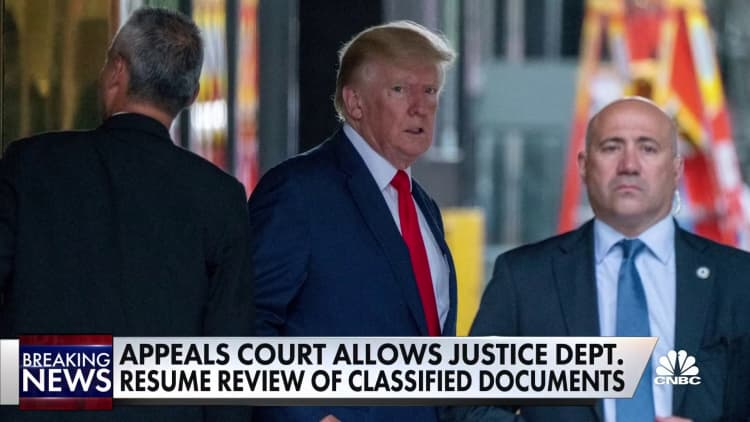
A federal appeals court on Wednesday said the Justice Department can resume using classified documents seized from former President Donald Trump's Florida estate in its criminal investigation.
The Justice Department had appealed a ruling this month by U.S. District Judge Aileen Cannon, a Trump appointee, that temporarily barred it from reviewing and using the seized materials for investigative purposes.
The appeals court panel, comprised of two Trump appointees and one Obama appointee, thoroughly rejected Trump's position on the classified documents and parts of Cannon's reasoning for issuing her original order. The appeals court said that among the factors under consideration were whether or not Trump had individual interest or need for the classified documents, which the district court had not mentioned in its analysis.
"Plaintiff has not even attempted to show that he has a need to know the information contained in the classified documents," the three-judge panel wrote in Wednesday's opinion.
More from NBC News:
The judges went on to argue that certain documents are deemed classified because they contain information that could harm the national security, and for that reason individuals may only have access to them if they need to know that information.
"This requirement pertains equally to former Presidents, unless the current administration, in its discretion, chooses to waive that requirement," they wrote, adding that Trump had not established that the Biden administration had waived its requirement for the documents.
The panel also rejected Cannon's reasoning that her order wouldn't get in the way of the Office of the Director of National Intelligence's risk assessment, with the appeals court calling the distinction between the risk assessment and the criminal investigation "untenable."
The Justice Department had argued that Cannon's order disrupted the intelligence community's ability to look over national security risks posed by the documents being improperly stored.
Cannon last week said she wasn't prepared to accept all of the department's assertions at face value without the special master review process.
But the panel on Wednesday pushed back on that assertion, arguing that nothing "beyond speculation" had been offered to undermine the government's sworn testimony that findings from the criminal investigation may be critical to its national security review.
The Justice Department previously said that its criminal investigation would look into identifying anyone who accessed the classified materials, whether they had been compromised and whether additional classified materials were missing.
"It would be difficult, if not impossible, for the United States to answer these critical questions if its criminal investigators are not permitted to review the seized classified materials," the appeals court wrote.
The ruling by the appeals court was the second legal blow to Trump on Wednesday. Earlier in the day, New York Attorney General Letitia James sued Trump, his three eldest children and the Trump Organization in connection with her yearslong civil investigation into the company's business practices.

